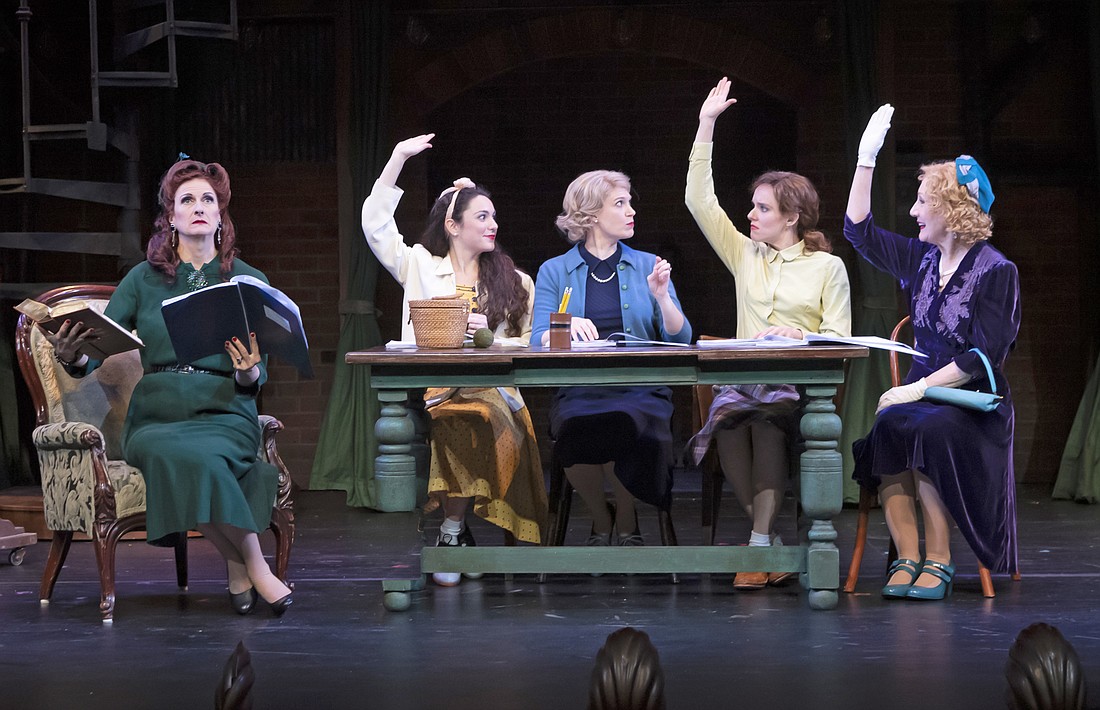- April 24, 2024
-
-
Loading

Loading

“Into the Breeches!” paints a portrait of America’s can-do spirit in the 1940s. The husband-and-wife team of playwright George Brant and director Laura Kepley brings it to life on the Asolo Rep stage. Their comic tale of an all-female production of Shakespeare’s “Henry IV” and “Henry V” cycle has an obvious nostalgic appeal. Brant and Kepley both hope that the play’s spirit of solidarity isn’t a thing of the past.
What was the inspiration for this play?
George Brant: Curiosity! Cleveland Play House turned 100 years old in 2015. They opened up the history books for the celebrations, and I couldn’t resist investigating.
Wait … This theater had its own history books?
GB: Absolutely. The women’s committee at Cleveland Play House kept fastidious records, huge scrapbooks. The more I got into it, the more interested I got. I discovered that this theater had never gone dark. Through depressions and world wars, they always had a season. I kept reading and became especially fascinated with the World War II era.
What fascinated you?
GB: Most of the men of military age men were away in the peak of the war. The theater lost half of its audience, actors and personnel. The women really stepped up, both as performers and behind the scenes. That can-do spirit really spoke to me.
Did they really put on plays with predominantly female casts?
GB: Yes, they did. It was funny to see how they changed the titles. “House of Men” would become “House of Women.”
Laura Kepley: We were also fascinated with the portrait these records painted of the strong connection this theater had with the men who’d been deployed.
GB: Right. The Women’s Committee sent all the servicemen monthly care packages, with chocolate, cigarettes and theater programs. The soldiers, when you look back at their letters, especially loved the programs. They made them feel that the world they loved back home hadn’t gone away. That inspired me.
When did you decide to always set the play in each theater’s hometown?
GB: “Breeches” was originally commissioned for Trinity Repertory Company in Rhode Island, so I wrote it specifically for that location. As I got into the area’s military history, I decided to do that with future productions in different cities. Every theater could work in the history of their area during World War II. That would show how different regions of the country supported the war effort, and make every production much more personal.
How do you keep the facts straight for each location?
GB: I created a glossary for the play. It lists different references and suggestions on how they might be changed for different communities.
LK: George did a lot of research on what was happening in Sarasota during the war. He found some extraordinary things.
Such as?
LK: Well, one thing that surprised us was that Longboat Key was used for bombing practice.
Wow. Hopefully the residents were informed.
LK: They were. But the island was still fairly uninhabited at the time.
You change the setting of the town. But is the theater always the Oberon Playhouse?
GB: Yes. Even when we did it in the Cleveland Play House, which most directly inspired the play, we kept the name of Oberon. It’s an extra level of fiction.
What would you like audiences to get out of the experience?
GB: The script is set in a time when America really came together. Everyone on the homefront pitched in to a remarkable degree. Rationing had a huge impact on clothing, driving habits, what you ate — everything. There was a common sacrifice, but people didn’t see it that way. Their attitude was: “There’s a war on. We’re all in this together!” That was the 1940s — and it stands in sharp contrast to the attitudes of our time.
LK: I agree. There’s so much division in our country today. It’s numbing. We get used to it. If anything, we’d like our audience to come away thinking, “We don’t have to get used to it. There’s a better way to be.”